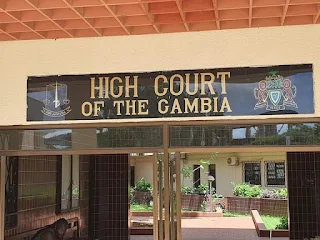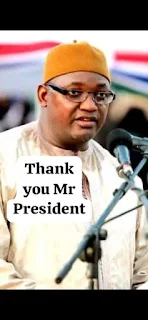Thursday, May 8, 2025
Editorial: GALA Misguided in Their Approach
The newly established activist group, Gambians Against Loathed Assets (GALA), appears to be misinformed about the legal framework governing protests in The Gambia. Rather than effectively advocating for change, their tactics of public demonstrations echo sentiments from a time when free expression was met with harsh repression. Just a few years ago, many Gambians lived in fear of dissent under a dictatorship where any attempt to protest could lead to dire consequences, including imprisonment or, in some cases, even death.
Today, however, Gambians can apply for permits to hold public demonstrations without fear of government retaliation. This shift illustrates a significant move towards freedom and democracy in our country. Despite this progress, it is essential to recognize that the right to protest is governed by the Public Order Act, which mandates obtaining police clearance to hold public gatherings. This law has undergone scrutiny and has been upheld by various courts, including the Gambia Court of Appeal and the ECOWAS Court, as evidenced by notable cases involving the United Democratic Party leaders.
Regrettably, some so-called human rights activists, journalists, and political figures—who once cowered under the regime of Yahya Jammeh—are now misleading our youth. They risk jeopardizing the future of these young people by encouraging protest actions that could lead to legal troubles.
The recent actions of the National Human Rights Commission (NHRC) serve as a stark reminder of this environment. In a disturbing turn of events, the NHRC leadership pressured the publisher of a critical investigative report to publicly vouch for former Justice Minister Abubacarr Tambadou. This move raises significant questions about the integrity and independence of our institutions.
The Gambia Press Union (GPU) has condemned such pressure tactics, which undermine journalistic freedom and professionalism. The allegations against investigative reporting should be met with transparency and accountability, not coercion or intimidation. The GPU strongly asserts that the rights of journalists to provide accurate and balanced information must be preserved without external interference.
As citizens of The Gambia, it is imperative to discern the motivations behind such advocacy and to engage in a manner that respects our evolving democratic framework. TRUE progress lies in fostering dialogue and understanding within the bounds of our laws, rather than descending into chaos that endangers our hard-won freedoms. Let us not be swayed by misguided leaders but rather advocate for our rights in constructive and lawful ways.
The Public Order Act Is Still Law
By Alagi Yorro Jallow
The Public Order Act: A Law of Controversy, But Still the Law. The Danger of Misinformation in Legal Discourse. The Case of Ousainou Darboe: A Legal Precedent.
Alagi Yorro Jallow
Few laws in The Gambia’s legal framework spark as much debate and contention as the Public Order Act. While critics argue that it is anti-democratic, the reality remains: it is a legitimate and enforceable law. Those who invoke constitutional principles must do so with accuracy and integrity, avoiding misinformation or political distortion.
The Public Order Act has been tested in court, challenged at the highest judicial levels, and remains legally binding. It is not a relic of dictatorship, nor is it an arbitrary tool of suppression—it is a law that has survived judicial scrutiny, including cases brought by prominent political figures.
The Case of Ousainou Darboe: A Legal Precedent
One of the most high-profile challenges to the Public Order Act came from Lawyer Ousainou Darboe, leader of the United Democratic Party (UDP). In 2016, Darboe and the UDP executive were arrested, tried, and convicted under this law for participating in unauthorized protests. Seeking justice, Darboe appealed his conviction at multiple levels:
• The Appeal Courts
• The Supreme Court
• The ECOWAS Court
Yet, each appeal was dismissed, reinforcing the legal validity of the Public Order Act. The courts upheld the government’s authority to regulate public demonstrations, confirming that while protest is a constitutional right, it must adhere to legal procedures.
This ruling sets a precedent—one that activists and legal commentators must acknowledge when discussing the law. In an era where social media amplifies narratives, it is imperative that discussions surrounding legal matters remain fact-based and intellectually honest. The Public Order Act is often misrepresented, with commentators twisting its provisions to fit political agendas. Conduct thorough legal research—understanding court rulings and precedents. Avoid political distortion—ensuring legal arguments remain objective. Uphold integrity in discussions—promoting fact-based activism rather than misleading rhetoric.
The Public Order Act remains a valid law, upheld by The Gambia’s highest courts. While its democratic implications can be debated, its legal standing is indisputable. Those who invoke constitutional principles must do so with accuracy, ensuring that public discourse remains informed, responsible, and free from manipulation.
Justice is not served through misinformation—it is upheld through fact-based legal challenges. If activists wish to contest the Public Order Act, they must do so through judicial processes, not through distorted narratives.The law is not perfect, but it is the law—and until it is successfully challenged, it remains binding.
Tuesday, May 6, 2025
GAF Warns Essa Faal And Samsudeen Sarr ToCease Misleading Statements
The Gambia Armed Forces (GAF) has issued a press release cautioning former Army Commander Samsudeen Sarr and aspiring presidential candidate Essa Mbaye Faal against making misleading public statements that misuse the name of the Armed Forces for political gain.
GAF expressed serious concern about a trend of unfounded commentary surrounding its operations within the democratic framework of The Gambia. The military institution highlighted specific remarks from Sarr, who referenced an isolated incident involving the Senegalese Gendarmerie and questioned the presence of GAF soldiers at key security installations. Such narratives, according to GAF, misrepresent the professionalism and non-partisan nature of the military.
Faal, in a recent interview, alleged government neglect of the GAF, claims that GAF describes as unfounded and potentially harmful. Such assertions politicize the Armed Forces, eroding public confidence in an institution committed to reform and accountable under democratic civilian authority.
The GAF High Command condemned these unethical comments, which they believe detract from national cohesion and could compromise security. They reiterated their commitment to professional standards and operational integrity in alignment with the Security Sector Reform agenda.
In its statement, GAF called on Sarr and other public figures to refrain from disparaging the military. The Armed Forces also urged political parties and media outlets, including West Coast Radio, to uphold professional ethics and avoid involving the military in political discourse.
GAF reaffirmed its dedication to maintaining peace and security in The Gambia and contributing to the nation’s socio-economic development. They encouraged all Gambians to support the Armed Forces in its mission to transform into a professional and democratically accountable institution.
Signed,
Colonel Lamin K. Sanyang
Director of Press and Public Relations
Gambia Armed Forces
6 May 2025
Friday, April 25, 2025
In Defence of Lawyer Mai Ahmad Fatty
By Yaya Dampha
Mai Ahmad Fatty’s bravery and dedication to the cause of
democracy in The Gambia cannot be overstated. His willingness to confront the
oppressive regime of Yahya Jammeh, even in the face of life-threatening
dangers, exemplifies true courage. The assassination attempt where a truck was
deliberately driven into his car serves as a stark reminder of the lengths to
which dictators will go to silence dissent.
Despite these harrowing experiences, Fatty’s resilience
shone through as he not only survived but also became a pivotal figure in the
fight for democratic governance in The Gambia. By founding his own political
party and rallying support from the Gambian diaspora, he has played an
instrumental role in advocating for democracy and human rights.
Mai Ahmad Fatty deserves respect and recognition for his
contributions to the struggle for freedom in The Gambia. His story is a
testament to the power of perseverance and the importance of standing up
against tyranny. It is vital that we remember and honor his sacrifices,
ensuring that they are woven into the fabric of our nation's history as we
continue to strive for a brighter future.Mai Ahmad Fatty’s advocacy and
political engagement reflect a commitment to the progress and development of
The Gambia a commitment underscored by the tangible advancements achieved under
President Adama Barrow’s leadership. In a nation that has long suffered from
neglect and mismanagement, it is vital to recognize the critical developments
that have unfolded in recent years.
Under President Barrow, The Gambia has witnessed a
transformation in infrastructure, with road networks expanding to connect
communities that have long been isolated. Access to electricity has reached the
most remote areas, illuminating lives that were previously shrouded in darkness
and deprivation. Healthcare services have improved significantly, making
essential medical care accessible to the marginalized populations that had been
overlooked for decades. Education services have also seen reinvigoration, providing
opportunities for the youth and fostering a brighter future for our nation
Mai Ahmad Fatty’s acknowledgment of these achievements is
not merely political maneuvering; it is a testament to his dedication to the
well-being of Gambians. Recognizing the progress made under the current
administration is crucial in fostering a constructive dialogue focused on the
future. While the struggle for democracy and human rights continues, it is
equally important to celebrate the milestones that have been reached and to
encourage more development-oriented initiatives for the benefit of all citizens.
As we reflect on the journey towards a democratic and
prosperous Gambia, let us embrace a spirit of collaboration and constructive
criticism. Mai Ahmad Fatty’s endorsement of developmental progress is an
invitation to all political actors to prioritize the needs of the Gambian
people above partisan squabbling. It is a call to work together in a shared
commitment to create a society where every individual can thrive, benefiting
from the liberties won through decades of struggle.
In recognizing the positive strides made, we bolster our
collective spirit and empower ourselves to continue the fight for a better
Gambia—one that honors both our past and our aspirations for the future. Let us
support leaders like Mai Ahmad Fatty, who advocate not only for justice and
accountability but who also appreciate the importance of development in
building a stronger, more united nation.
If someone sacrificed a minute for you try to respect them for a second.
Thursday, April 24, 2025
The NPP Government's Commitment to Reform and Progress
Defending Accountability: The NPP Government's Commitment to Reform and Progress
The recent dismissal of over one thousand workers in The Gambia, identified as "ghost workers" in a thorough audit, has ignited a wave of political criticism, primarily from certain journalists and opposition figures. These individuals have rushed to politicize the issue, alleging that the NPP government is to blame for employing these non-existent workers. However, such claims overlook the significant strides the government has taken towards accountability and reform within the labor sector.
The term "ghost workers" refers to those who remain on official payrolls yet are neither present nor contributing to their organizations. This issue is not unique to The Gambia; it has been a persistent challenge in various countries worldwide, especially in developing nations where systems of monitoring and accountability may not be as robust.
Acknowledging the Reality of Unaccounted Workers
Critics tend to focus solely on the recent firings, ignoring crucial factors that have led to this situation. Many of the affected employees were engaged in roles that did not involve regular clocking in—such as field workers in agriculture or education. The lack of digital timekeeping tools in these sectors presents a challenge in tracking actual attendance, making it easier for discrepancies to arise.
The NPP government has shown a commitment to addressing these fundamental issues. By undertaking a comprehensive audit to identify ghost workers, the administration has demonstrated its dedication to transparency and efficiency. This proactive approach signifies that the government is not only interested in worker accountability but also in ensuring that public resources are utilized effectively for the benefit of the Gambian people.
Progress Amid Criticism
It is crucial to recognize that the broader issue of ghost workers is exacerbated by economic migration and systemic inefficiencies—factors that have been longstanding challenges in our society. Many young civil servants, seeking better opportunities abroad, have left their posts, resulting in discrepancies in employment records. Instead of placing the blame on the government, journalists and critics should consider the complex socio-economic landscape that contributes to these challenges.
Moreover, while some journalists paint the narrative of governmental negligence, they fail to acknowledge the progress the NPP government has made. The introduction of modern work practices and technology is vital for mitigating the risk of ghost workers. By investing in digital solutions and transparent labor management systems, the NPP is taking significant steps to reform the public sector workforce.
A Call for Constructive Engagement
It is essential for journalists and commentators to engage constructively with these developments rather than resorting to politically charged accusations. The endless cycle of blame only serves to create division rather than fostering a cooperative atmosphere that can lead to meaningful change. The NPP government is tirelessly working towards building a transparent, accountable, and efficient public service, and we—all stakeholders—should support this mission.
In conclusion, rather than focusing solely on the issue of ghost workers through a polarizing lens, we should recognize the commendable efforts made by the NPP government to enhance accountability in the workforce. Embracing a collaborative approach to address these concerns can lead to a more effective governance model that ultimately benefits all Gambians. It is time to champion constructive dialogue and support the government's initiatives for a better, more accountable future.
Saturday, April 19, 2025
Fugitive Wandy Simaga Convicted for Firearm Possession Following Airport Escape
Wandy Simaga Found Guilty After Dramatic Escape and Subsequent Arrest
The Gambia Police Force has confirmed the conviction of Wandy Simaga, a fugitive who escaped from custody at Banjul International Airport on September 28, 2024. Simaga had been on the run until his capture on April 13, 2025, following an extensive manhunt.
Upon arriving in The Gambia aboard a Vueling Airline flight, Simaga was intercepted by security personnel and found in possession of two pistols, eight pepper sprays, and thirteen mobile phones, all suspected to be contraband. During a high-risk screening conducted by various law enforcement agencies, he managed to evade capture and escape the scene.
Following his recapture, Simaga was arraigned before Her Worship Anna O. Mendy, Principal Magistrate at the Brikama Magistrates’ Court. He faced two serious charges:
1. Importation of prohibited firearms, in violation of Section 6 of the Arms and Ammunition Act (Cap 20:01)
2. Possession of firearms without authority, contrary to Section 8 of the same Act.
In court, the charges were read and explained to Simaga in Mandinka, to which he pleaded guilty. He accepted the facts presented without objection.
As a result, he was convicted and sentenced as follows:
- Count One: a fine of D100,000 or two years’ imprisonment
- Count Two: a fine of D100,000 or two years’ imprisonment
The sentences are set to run consecutively, meaning Simaga faces a total of four years in prison if he is unable to pay the fines. Additionally, the court ordered the forfeiture of the two pistols—designated as Exhibits A and B—to the state, following the prosecution's request in accordance with Section 25(3) of the Arms and Ammunition Act.
The Gambia Police Force praised the successful resolution of the case, reaffirming its commitment to pursuing fugitives, upholding justice, and safeguarding national security.
Subscribe to:
Comments (Atom)




















